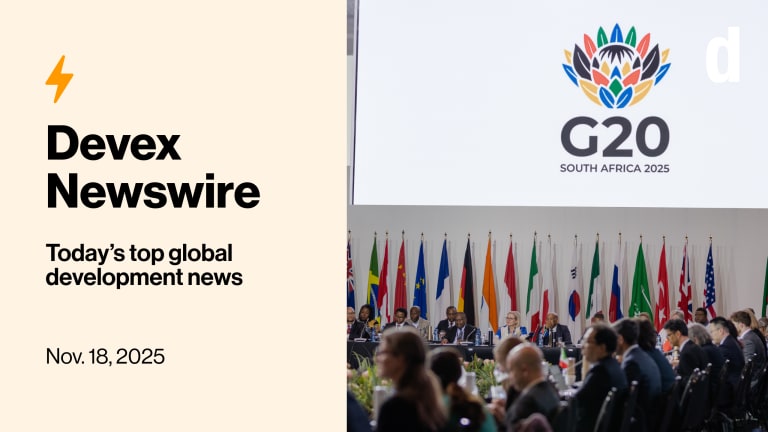Opinion: Here's how to stop global aid from being so condescending

Born in Sierra Leone, I spent part of my childhood as a refugee and an internally displaced person. The mere sight of aid workers — who were often foreign and white — always inspired me, not least because people like me relied on them for food, shelter, and clothing.
As a young activist, I became a poster child for development aid. I was an oft-cited example of what can happen when aid works — that is, when a young person draws on scholarships and other opportunities from global north donors and institutions to rise from the slum into elite universities. I spoke the language of global development and became its face on major platforms and advisory groups.
Those experiences allowed me to fulfill my childhood dream: to be a humanitarian aid worker. I served in Haiti, Liberia, the Philippines, and Lebanon, among other countries. Now, I am co-founder and co-CEO of Purposeful, an Africa-based NGO that relies on funds from institutions and structures from the global north.
So it might surprise many people to learn that, along the way, I’ve become quite disenchanted with global development, as well as the institutions and systems that underpin it. Why? Because the more of it I’ve seen, the more I’ve realized how it reflects — and in many ways promotes — a system of inequality and injustice rooted in the ideas and legacies of colonialism.
My view has been shaped by my frequent exposure to the patronizing relationships between aid donors and the countries and organizations they support. Too often, funding comes with narrow parameters, inflexible requirements, and problem-solving approaches that are like round peg solutions conjured up in Western capitals to fit in square holes.
Often predominantly white, Western donors presume to know more about the places they are funding than the people who live and work in them, and they mobilize global northerners to parachute in and displace locals to manage development projects.
Development funding almost always comes with onerous monitoring and reporting requirements that go beyond simple accountability measures and send an unmistakable message that aid recipients — that is, Black and brown poor people — cannot be fully trusted stewards of those resources. And when global north “implementers” receive disproportionately larger chunks of funding than their local counterparts, I can’t help but wonder who is benefiting most from development aid.
The hierarchical power relationships between the holders of wealth and power and their clients also show up in condescending and sometimes hurtful development lingo.
Consider, for example, terms such as “fieldwork,” as if the countries where development takes place are beyond established, more civilized regions; “vulnerable,” “marginalized,” and the “poorest of the poor,” suggesting that so many of those supported by global development aid are — at least by Western standards — powerless to help themselves; and “lack of capacity,” an assumption that countries do not have the know-how or moxie to solve problems and make their societies run well.
It doesn’t take a huge leap to realize that much of that vocabulary comes from feudalism, colonialism, and even slavery.
Purposeful, which focuses on strengthening girls’ presence in the social, political, and economic life of their countries, has consciously pursued an approach almost directly opposed to the dynamic typically seen in global development aid relationships.
Often predominantly white, Western donors presume to know more about the places they are funding than the people who live and work in them.
—For instance, Purposeful provides direct, unrestricted cash to girls and nonbinary groups to power their own activism. When I describe that model to others in the development community, I often feel the temperature rise around us. To them, unrestricted funding sounds so risky, so radical! It’s a recipe for failure, isn’t it?
A simple answer is that when the basis of our relationship is trust, these groups flourish. We at Purposeful trust them to understand better than we do the challenges they’re facing in their own communities and how best to resolve them.
We believe the money we provide belongs to them anyway, and we work and communicate with them as full allies and partners — not as contractors or “grantees.” We do not require complex application processes, and we do not create elaborate reporting or monitoring, evaluation, and learning requirements. Verbal communication, meetings, calls, or mutual storytelling and exchanges do the trick.
More importantly, we believe the girls we support have the right to fail. We support them to experiment and, yes, sometimes fail together. The reality, however, is that with all of this trust and freedom, we see more true determination and collective liberation and solidarity.
I, of course, have to acknowledge that my organization operates on a far smaller scale than the major aid donors do, and I know that development ministries face mighty political and legal pressures to carry out development aid as they do. I know there are many truly committed people working within a system that has, over many decades, baked in age-old assumptions, perceptions, and practices that at the very least insult the people they purport to help and, at worst, undermine their goals and aspirations.
The problem is also inertia. “We do it this way,” aid leaders seem to say, “because it’s the way we’ve always done it.”
I am well aware that these are uncomfortable sentiments, especially within a community of many friends and allies who I know mean well. But now is the time for people in the global north and global south to come together and own up to how the history of colonization has evolved into a present-day structure that could be so much better than it currently is. That is an essential first step toward people taking control of a faulty system rather than being swept along by it forever.
Search for articles
Most Read
- 1
- 2
- 3
- 4
- 5








